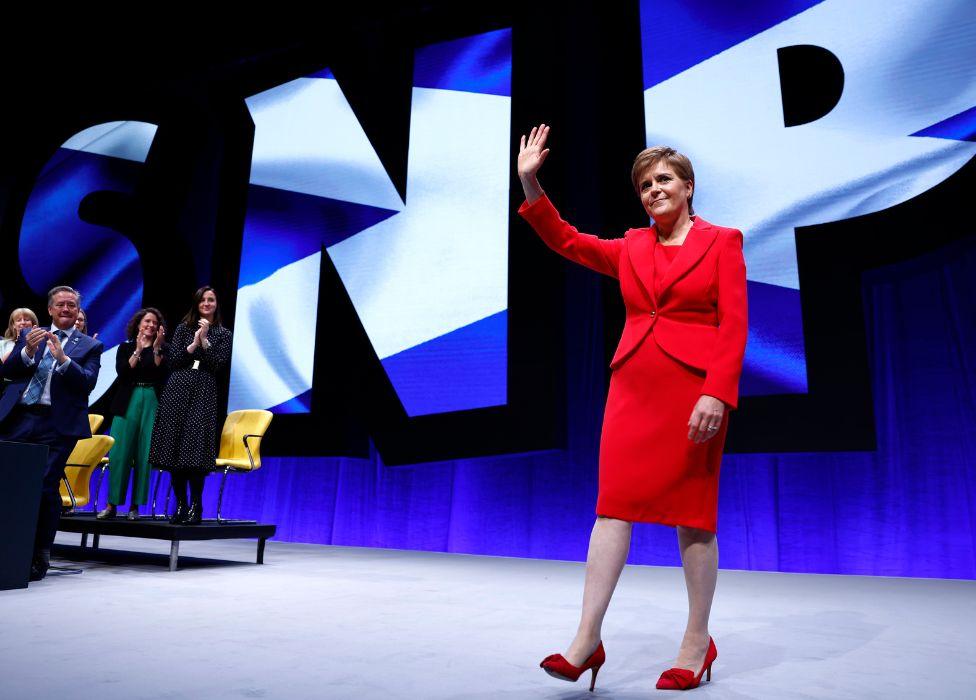SNP to hold special conference on independence in 2023
- Published

Nicola Sturgeon has confirmed an event will go ahead in spring 2023
The SNP will hold a special conference in March to decide "the way forward to secure independence", the party has announced.
The event is billed as an opportunity to set out a "clear pathway" on Scotland's constitutional future.
It follows a UK Supreme Court ruling that Holyrood does not have the power to stage another referendum.
First Minister Nicola Sturgeon has said the SNP will fight the next general election as a de facto referendum.
Confirming next year's conference, she tweeted: "The SNP Special Conference to discuss and decide the way forward to secure independence following UK Supreme Court decision will take place in Edinburgh on 19 March."
Allow X content?
This article contains content provided by X. We ask for your permission before anything is loaded, as they may be using cookies and other technologies. You may want to read X’s cookie policy, external and privacy policy, external before accepting. To view this content choose ‘accept and continue’.
SNP business convener Kirsten Oswald announced that the event would be held at the Edinburgh International Conference Centre.
She said: "The SNP's Democracy Scotland Conference in March will set out a clear pathway to Scotland being able to express their view on our nation's constitutional future.
"The Supreme Court verdict has galvanised the Yes movement right across Scotland. More and more people recognise independence not just as desirable but necessary."
She cited the five most recent polls on independence, all of which have recorded majority support for Yes once undecided voters are removed.
"This surge in support will be terrifying the Westminster establishment," Ms Oswald said. "People know that to tackle the cost-of-living crisis, escape Brexit, invest in the NHS and pay public sector workers a fair wage the Scottish Parliament needs the full powers of independence.
"The more that [Prime Minister Rishi] Sunak and [Labour leader Sir Keir] Starmer tell us we have no right to decide our own future, the more people in Scotland will stand up and demand that basic democratic right."
The UK government has consistently refused to countenance the prospect of another vote on independence, or a de facto referendum.
'Constitutional lily pad'
A spokeswoman said: "People in Scotland want both their governments to be concentrating on the issues that matter most to them - like growing our economy, getting people the help they need with their energy bills and supporting our NHS.
"As the prime minister has been clear, we will continue to work constructively with the Scottish government to tackle our shared challenges."
Scottish Conservative constitution spokesman Donald Cameron branded the conference a "needless diversion".
He said: "The timing will jar with Scots worried about their household finances.
"The nationalists are tired after 15 years in power and are merely looking for the next constitutional lily pad to hop on to."
Scottish Labour's constitution spokeswoman Sarah Boyack said: "The SNP are desperately scrambling for relevance because they know only Labour can kick the Tories out of government and deliver the change we need."


Nicola Sturgeon first mooted the idea of trying to turn the next election into a substitute referendum on independence back in June.
At that time, she said if indyref2 was blocked, the SNP would "fight the UK general election on this single question: should Scotland be an independent country?"
In a BBC interview, she made clear a majority of votes would need to be secured for her to claim a mandate.
That still left lots of questions. Would there need to be a majority for the SNP or for independence-supporting parties collectively? If they won, would they seek to negotiate independence, the means to hold a referendum or something else?
There is further debate in the "yes" movement about whether the next Westminster or Holyrood election would be the best test.
I'm told the special conference will debate and choose between options on the way forward, none of which are likely to persuade UK supporting parties to accept an election result as a verdict on independence.